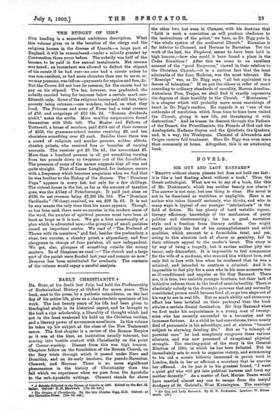NO S.
SIR GUY AND LADY RANNARD, " BEAUTY without charm pleases but does not hold one fast : it is like a bait floating about without a hook." Thus the Greek anthologist. What are we to say of a book, like this of Mr. Dickinson's, which has neither beauty nor charm ? The answer is not easy, but one thing is clear. His novel is not to be dismissed as worthless or negligible. Here is an author who takes himself seriously, who thinks, and who in many ways is typical of our younger " intellectuals " in the field of fiction. He has plenty of hard metallic vigour, literary efficiency, knowledge of the mechanism of party politics and electioneering ; he has a good narrative style and a freedom from literary artifice. One might easily multiply the list of his accomplishments and solid qualities, which amount to a formidable total, and yet, owing to this absolute lack of charm or geniality, fail in their ultimate appeal to the reader's heart. The story is by way of being a tragedy, but it excites neither pity nor terror, only discomfort. It is impossible to feel compassion for the wife of a madman, who married him without love, and only fell in love with him when he confessed that he was a criminal, and intended to continue a criminal. And it is impossible to feel pity for a man who in his sane moments was so ill-conditioned and angular as Sir Guy Rannard. There are, it is true, two amiable younger brothers, but their lack of initiative reduces them to the level of semi-imbecility. There is absolutely nobody in the dramatis personae that any normally constituted person could become fond of, or go two steps out of his way to see in real life. But so much ability and strenuous effort has been lavished on their portrayal that the book attains a certain dismal fascination. Sir Guy Rannard when we first make his acquaintance is a young man of twenty- nine who has recently succeeded to a baronetcy and an immense fortune. As a child he had convulsions, twice nearly died of pneumonia in his schooldays, and at sixteen "became subject to alarming fainting fits." But as "a triumph of parental care" he bad completely outgrown these various ailments, and was now possessed of exceptional physical strength. The starting-point of the story le the Gen,eral Election of 1906, in which he has been defeated. But he immediately sets to work to organise victory, and aumnioning to his aid a cousin hitherto immersed in parish work in London, finds in her so efficient a secretary that he marries her offhand. As he put it to his greatest friend, "I want a quiet girl who will get into political harness and treat my mother decently." As a matter of fact, Marian Deane would have married almost any one to escape from the insipid drudgery of St. Gabriel's, West Kensington. The marriage • Sir Guy and Lady Rannard. By IL N. Dickinson. London s W. Heine. mann. [68.3 proves a ghastly failure at the outset. Marian is bored to death by her husband's absorption. in his candidature, repelled by his strange associates, and affronted by his suspicion and secretive- ness. During the whole of a hotly contested by-election Marian holds aloof from her husband until, on the night of the poll, he is assaulted in his own house by a prize-fighter whom he soundly thrashes. This heroic exploit fires her dormant
affection, she begs forgiveness for her neglect, and when he explains that he has won his election by a wholesale system of bribery the reconciliation is complete. This, however, is only the first move in a colossal campaign for reorganising his party by the same corrupt means. Accordingly Marian accompanies him on a tour in which he tries to get into touch with the leaders of his party, but only succeeds in exciting their suspicions, and filially convincing them of his insanity. Marian, however, hypnotised by his energy and Littered by his deference to her judgment, is time last person to realise the truth. The immediate sequel is best summarised in the author's own words :—
" She knew then, or acknowledged, while the fabric of her self- deception was shattered with her will to sustain it, that he was mad; that he had been mad while she had loved him, and feared his strength with rapture that could be remembered, and while they had journeyed together ; that she had lavished her worship on the symptoms of imbecility, hung upon his neck and caressed the frame-work of a morbid process, adoring a disease and cherish- ing its ordered characteristics as they arose ; that his boyish waywardness and charm had been the phases of a malady and his tenderness a mental decay ; that his affection for her had been a pathological accident ; that the force of his manhood had been s by-product of demented energy."
The progress of Guy Rannard's mania is described with a good deal. of ability and restraint, if we except the melo- dramatic collisions with an anarchical journalist named
Quain,—a Quilp-like figure without Quilp's sardonic humour. There is a good deal of minute and rather tedious particularity
in the narrative, as, for example, the references to Guy's tub of cider; but, considering the subject, we are mercifully spared any repulsive details, and it is only right to congratulate Mr. Dickinson on his entire abstinence from the strong
language which persistently de-decorated the conversation of his last novel. Still, when every admission and recognition
has been made, we have no hesitation in pronouucing Sir Guy and Lady Rannard to be one of the dreariest essays in the gratuitous that we have ever read.















































 Previous page
Previous page